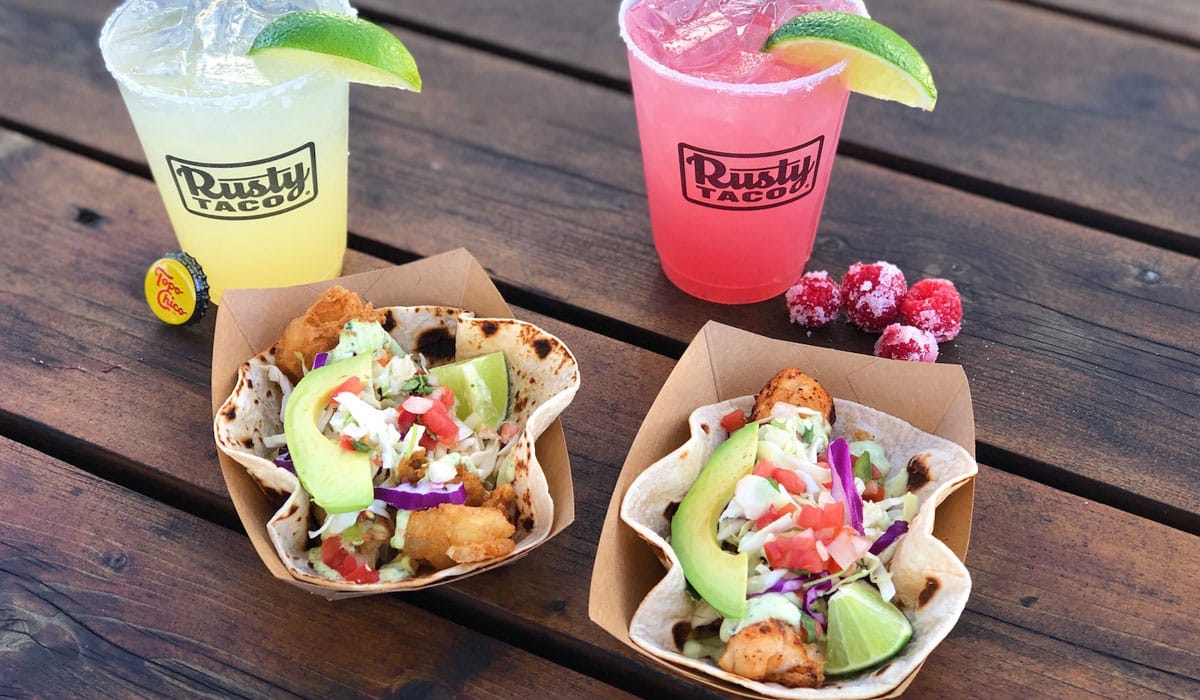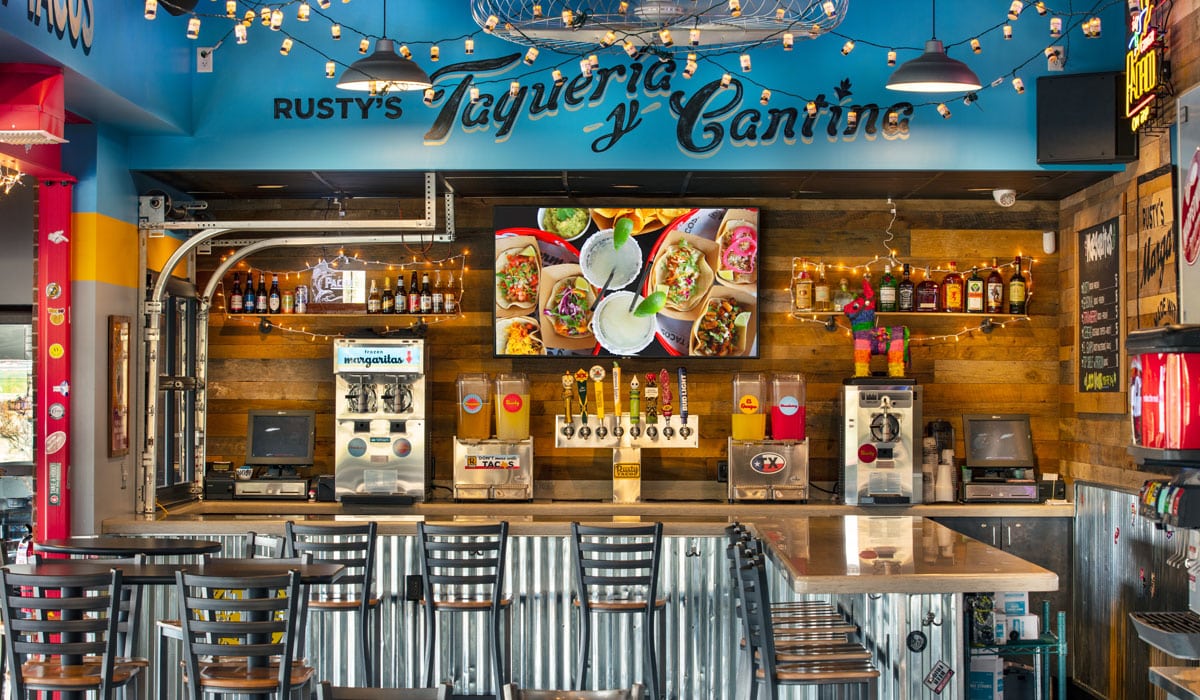Brendan Mauri was promoted to president of Rusty Taco just a few months after joining the brand as head of marketing.
He describes it as both an interesting and challenging time.
Interesting because the fast casual was looking to fuel franchise growth, but challenging because those events took place during the early part of 2020, just as the COVID pandemic began sweeping through the U.S.
In the face of turmoil, Mauri remained confident because he knew Rusty Taco was backed by Inspire Brands, the second-largest restaurant company in the U.S. and parent of well-known chains Buffalo Wild Wings, Dunkin’, Jimmy John’s, Sonic, and Arby’s. The taco concept leveraged work completed across the system, including knowledge of local restrictions, implementation of new operational procedures, and use of new sanitation practices.
Within a few months of the initial shock, sales returned to black, and it’s only accelerated from that point.
“I’m fortunate to have worked at other brands—lots of great brands—but the franchise group at Rusty Taco is just a really strong group,” Mauri says. “So that really helped, as well, just being able to collaborate with them, bounce ideas off, and having them talking to each other.”
The 38-unit Rusty Taco was founded in 2010 by Rusty Fenton. A year after he passed away from cancer, Buffalo Wild Wings acquired a majority interest. Then in 2018, the casual-dining giant was purchased by Arby’s Restaurant Group, bringing Rusty Taco along with it. The acquisition brought Inspire to life.
With the backing of the multi-brand platform, Rusty Taco has spent recent years setting itself up for growth, Mauri says. Multiple franchise agreements were signed in 2021, which will lead to growth throughout Utah, Nevada, Virginia, and Texas. Several new operators are already a part of the Inspire family.
Sean Cosper of Home Run Restaurant Group, who owns 13 Arby’s in Utah, plans to open three Rusty Taco stores in Salt Lake City. Ian and Taylor Cain of Ocathain Partners, a brother-sister team that opened a Sonic restaurant in 1999, are developing two Rusty Taco locations in Reno, Nevada. Sheila Abusaab of Lion’s Den, who oversees Sonic stores throughout West Texas, signed a five-restaurant deal, with the first units to open in Midland and Lubbock.
Meanwhile, brothers Fenil and Jitesh Patel from Tacos of Heaven are new to Inspire Brands, after operating a host of restaurant brands and hotels over the years. They plan to debut two Rusty Taco locations in Norfolk, Virginia.
With several stores now under construction, Mauri believes 2022 will be the “launch point for growth.”
If Rusty Taco expands strategically, the president says there’s potential for 40–50 new units per year, possibly even higher. For 2022, the fast casual is eyeing 30 percent growth, which would be about a dozen restaurants.
The chain’s most recent opening came in San Antonio, a restaurant owned by Andy Besing and Perrin Larsh of Lone Star Restaurant Group. The duo also operates four Arby’s restaurants. Mauri says warm weather states like Texas, New Mexico, and Arizona are attractive because of the outdoor patio potential, but he also notes franchisees have had success in Minnesota and Ohio.
“I think it speaks to our brand can really play well almost anywhere,” Mauri says. “And tacos and margaritas and amazing queso are such a broad appeal and a growing category. So what we’re seeing is, we’ve got some focus areas, but especially with Inspire, we have franchisees coming to us from Inspire in particular that maybe maxed out in the market they’re in and they’re interested in diversifying into another brand. And so we’re open to a variety of regions when opportunities come at us that way.”

“We’re founded on a street taco neighborhood taco stand experience, and we always stay true to that,” says Brendan Mauri, president of Rusty Taco.
Rusty Taco restaurants are usually between 2,400 and 2,800 square feet, but some stores fall outside of that range, like one 2,000-square-foot store that’s performed well, according to the president. The brand has inline and standalone outlets, but endcap is the preferred and most common destination due to the patio space.
Although more quick-service chains are exploring drive-thru, Rusty Taco decided to move against that trend because of its scratch-made menu. However, the fast casual does plan to investigate mobile order pickup windows.
Before COVID, the brand skewed toward dine-in; almost two years into the pandemic, the mix between dining room and off-premises is about 50/50. Digital used to represent less than 10 percent of sales, and that’s risen to around 30 percent.
“We want to be in tune with guest trends and what guests are looking for going forward,” Mauri says. “And so we’ve certainly adapted in that way. That said, a big part of our brand also is the dining experience—come as you are, relaxed atmosphere. When it’s in-season we do a great amount of our business on patios and so I think it’s a balance. But our food travels really well. We see so many people taking it to-go that we’re adapting to that, as well.”
One of Rusty Taco’s most notable off-premises ventures was the opening of Inspire’s Alliance Kitchen, the first ghost kitchen owned and operated by a multi-brand restaurant company. Based in Atlanta, the venue allows customers to order through a particular brand’s online ordering platform or via third-party apps.
Mauri says Alliance Kitchen facilitated Rusty Taco’s first entrance into Atlanta and has provided valuable learnings on nontraditional operations. The chain already has one in U.S. Bank Stadium in Minneapolis, and the president sees potential for more nontraditional spots in airports, college campuses, and other stadiums.
“[Alliance Kitchen] has allowed the ops teams across the brands to see how all the brands operate side by side, and that’s given us various insights that we can apply to all of our restaurants across the country,” Mauri says.
Rusty Taco is among a list of taco fast casuals eyeing growth in 2022 and beyond. The 150-unit Fuzzy’s Taco Shop hopes to double in size to more than 300 stores in the next five years. The chain opened this year by announcing a 50-unit agreement for the Southeast. Additionally, Velvet Taco aims to reach 40 units by the end of 2022, and Torchy’s Tacos recently debuted its 100th store.
Mauri says there’s room for multiple chains in the category, given the high demand. As for how Rusty Taco will maintain its share of that available demand, he points to the collaborative support of Inspire, which helped the company roll out an award-winning learning management system, among other initiatives.
The industry veteran also lauds Rusty Taco’s simple and fresh menu, filled with unique ingredients, house-made salsas and sauces, and hand-made tacos.
“We’re founded on a street taco neighborhood taco stand experience and we always stay true to that,” Mauri says.







